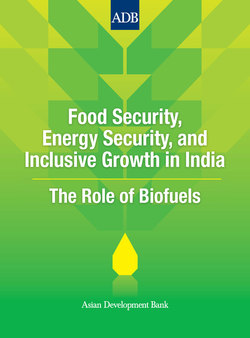Читать книгу Food Security, Energy Security, and Inclusive Growth in India - Herath Gunatilake - Страница 7
На сайте Литреса книга снята с продажи.
Introduction
ОглавлениеA nation’s energy policy often involves choices between complex tradeoffs amid uncertainty concerning future developments. For rapidly growing India, the growing energy demand can be partly met by biofuels such as bioethanol and biodiesel. Energy and food policies, however, must balance different and conflicting uses of resources such as land and water.1
In India, like many other developing countries, food security is a prime concern. Meeting the increasing food demand has been a challenge with a growing population and a fixed amount of arable lands. Growing rural incomes and frequent weather fluctuations experienced in recent times will make this an even bigger challenge. The Green Revolution, with its tremendous impact on increasing yields and production, has cushioned India against food shortages. However, policies related to food production and distribution continue to be vital. The need for concerted efforts to maintain access to food for all will remain.
Energy policy, while needing to underpin sustained economic growth through increasing supply, has also come to focus on ways to reduce reliance upon fossil fuels, particularly imported petroleum products. Global energy supplies are likely to tighten over the next few decades and this could lead to debilitating price shocks. Petroleum fuels also contribute to global warming through emissions of greenhouse gases (GHGs).
Biofuels lie at a nexus of food and energy policies. Biofuels can be produced from domestic agricultural sources and represent alternatives to the use of petroleum-based fuels (Box 2). Bioethanol can substitute or be blended with petrol, as can biodiesel with conventional diesel. These fuels can lower fossil fuel imports and reduce GHG emissions. However, biofuel feedstocks require resources such as land and water, and care must be taken to ensure that policies to enhance energy security do not worsen food security.
Box 2 Biofuels
Biofuels are liquid energy substitutes for traditional petroleum-based products such as diesel or petrol (gasoline).
In theory, or in laboratory procedures, a large number of biofuels can be produced from a variety of different organic sources, including waste products. However in practice, in the immediate future, there are only a limited number of processes and feedstocks that can be brought onstream to reduce the current reliance upon petroleum-based fuels. In India, there is the potential to produce bioethanol and biodiesel.
• Bioethanol is ethanol or ethyl alcohol produced from plant sources, especially from sugar or starch-laden feedstocks. Bioethanol has many uses, including as a base for alcoholic beverages, but also in industrial processes. It can be blended with petrol.
• Biodiesel is a substitute for petroleum-based diesel fuel that can be produced from plant oils or animal fats. It can be blended with petroleum-based fuel and can be used in most conventional diesel engines.
This report focuses on transport biofuels that can be produced with existing technology (Box 3). Sugarcane is the main bioethanol feedstock (either through the use of molasses or from sugarcane juice), but the tropical sugar beet and sweet sorghum were also examined as alternatives. Jatropha and pongamia were the biodiesel crops considered.
Box 3 The Asian Development Bank Grant TA-7250
This report is the result of work done under an Asian Development Bank (ADB) grant, TA-7250 (IND): Cross-Sectoral Implications of Biofuel Production and Use. The grant provided the Government of India resources for a comprehensive analysis of the impacts of large-scale production of biofuels. A team of consultants, under the direction of ADB staff, undertook the studies beginning in December 2009. This team worked with a steering committee to ensure a transparent and consultative process. An oversight committee, consisting of eminent economists and scientists, endorsed the findings on 26 September 2010. The detailed final report of the technical assistance project is available on the ADB website at: www.adb.org/Documents/Reports/Consultant/IND/42545/42525-01-ind-tacr-01.pdf
